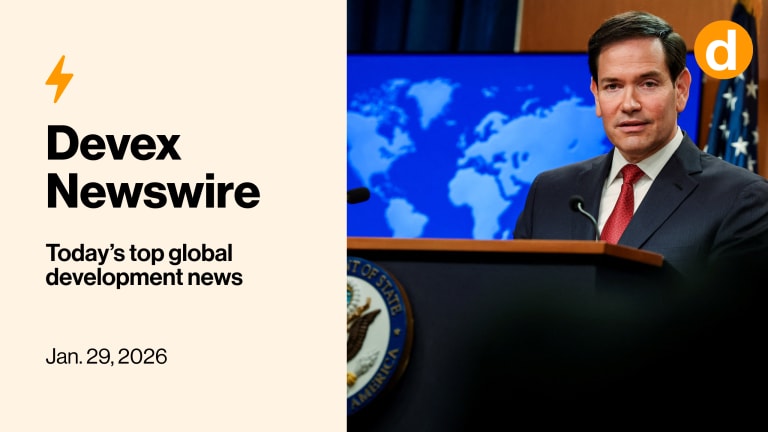Development Business in Guatemala: What You Need to Know
After a long slump, development funding for Guatemala is expected to increase. Key donors such as Europe, the U.S. and Japan focus much of their work on good governance and security.
After years of decline, U.S. development funding for Guatemala is set to increase with a focus on consolidating the nation’s fragile democracy and reducing frightening levels of crime and violence. The U.S. Agency for International Development is the largest bilateral donor to Guatemala. Since the early 2000s, the agency has disbursed $40 million annually, making Guatemala one of Central America’s lowest per-capita recipients of U.S. development funds. Funding rose to $77 million in 2009 and is expected to increase further. “There are more programs initiating now than ever before,” said USAID contractor Casey Wheeler. Japan and Spain have been Guatemala’s other major bilateral donors in recent years. They have gradually increased their contributions, averaging between about $20 million and $40 million per year. Focus on governance Most donors said their development priority for the near future will emphasize governance, security, and the rule of law. Guatemala is experiencing a crime wave that has made it one of the most violent nations in Latin America. Its justice system is also widely seen as corrupt and ineffectual. “There’s been a huge investment in the justice system in the last 10 years, but there is still a lot of work to do to change the mentality of the people,” said Mercy Corps Country Director Borys Chinchilla. “Right now, if you are poor and you are in trouble, you go to jail,” he said. “But if you [are rich], it will be easy for you [to avoid justice].” USAID Guatemala confirmed that democracy and governance is the top priority in the country. Programs include establishing 24-hour courts, mediation and justice centers, community-based policing, and national-level policy reform. According to the agency, the Merida Initiative, which provides U.S. funding and training to Mexico and Central America security forces, will also stimulate the administration of justice programming in Guatemala. Congress approved $175 million for 2008-2009 and is considering an additional $100 million for 2010 to provide equipment and training for the region’s security agencies. After democracy and governance, another major development sector in Guatemala is increasing economic growth, including the implementation of the Dominican Republic-Central America-United States Free Trade Agreement, or CAFTA-DR. Although it has economic potential, Guatemala is one of the most unjust countries in the world in terms of distribution of wealth. Poverty, particularly among the nation’s indigenous population, is widespread. Health and food security are also growing sectors. Guatemala is suffering a famine that has killed more than 400 people since January 2009 due to a long-term drought and the inability of the government to get food to needy communities, among other factors. In order to address the crisis, USAID officials said they expect to receive $25 million for food security programs in 2010. Much of this aid will be directed to the country’s northeast, which has been hit hardest by the famine. European donors have taken the lead in supporting HIV prevention and family planning in the wake of declining USAID support for reproductive health in Latin America. “We deal a lot with condoms; we were a target of people [in the U.S.] who didn’t want us to be funded,” said Judith Heichelheim, Population Services International deputy regional director for Latin America. “I think that’s part of the reason that the Europeans came in as strongly as they did because they realize that this was key to having better health outcomes.” Although based in Washington, PSI Guatemala receives funding from the Dutch government, German development bank KfW Entwicklungsbank and the Global Fund to Fight AIDS, Tuberculosis and Malaria, which is based in Geneva. Other than stronger support for reproductive health projects, European programming tracks the sectoral priorities of the U.S, with a focus on social cohesion, human security, and economic growth. Ten European Union member states – Austria, Germany, Spain, Sweden, the Netherlands, Denmark, Italy, France, Finland and the U.K. – have traditionally supported development projects in Guatemala. They disbursed $281.5 million for development initiatives between 2002 and 2006. The Japan International Cooperation Agency focuses on infrastructure, vocational training and public health issues, including disease control and prevention. From 2001 to 2005, JICA’s annual aid to Guatemala averaged about $34 million. A focus on indigenous communities Europe, the U.S. and Japan focus many of their development initiatives on the nation’s large and impoverished indigenous communities. More than 40 percent of Guatemala’s citizens are of non-European descent and still speak their Amerindian languages, in addition to observing pre-Columbian cultural practices. “One of the reasons we had this 30-year conflict [the Guatemalan civil war] was because of the lack of fair distribution of land between Spanish-descendent people and the indigenous population,” Chinchilla said. Much of the aid flowing into the country is directed toward Guatemala’s mountainous north and west, where the indigenous communities are centered. Anti-crime interventions are focused on urban areas, particularly the capital. “Guatemala City is the focus of institutional strengthening, and the highlands are the areas where we are doing actual implementation working with communities,” said USAID Development Communication Specialist Wende DuFlon. HIV programming also tends to be urban-based because of the higher prevalence of prostitution in Guatemala’s cities. Mosaic of development organizations Guatemala is chock-full with development organizations of all types: local, international, regional, bilateral and multinational. Development professionals said that while there is little formal donor coordination, there is widespread collaboration among development entities in funding and implementing projects. “We are always looking for strong partnerships with local or international organizations,” Heichelheim said. “We have different kinds of relationships with organizations depending on where they are [based].” USAID alone has 40 implementing partners in Guatemala. “There is quite a range, from nonprofits to private local organizations, to private international organizations,” said Todd Sloan, USAID’s director of democracy and governance for Guatemala. “One of the things we look at more and more is who is able to collaborate locally and has partners for sub-grants.” Sloan added that USAID will be partnering more with local civil society organizations as USAID’s democracy and governance portfolio expands. The United Nations Development Program, which has had a strong presence in Guatemala since the U.N.-brokered signing of the 1996 peace accords, also partners with USAID to implement democracy and governance projects. With so much collaboration occurring among development organizations, reputations are built – and dismantled – rapidly. “Guatemala is a small country,” Chinchilla said. “If you have a good reputation, people will know in three months. If you have a bad reputation, people will know in one week. Anytime we go to a place, they already know about us.” In seeking local partners, roots in the target communities are one of the key characteristics that international organizations desire. “The first thing we look at is that they are in close contact with the community that they serve – that they really understand what is going on,” Chinchilla said. Chinchilla also said there is a preference for organizations that are managed in the community where programs are implemented. “We don’t want people that are going to pick up the check in Guatemala City,” he said. In addition to needing local knowledge, many international organizations in Guatemala are explicitly tasked with building local non-governmental organizations’ capacities, so there is always a demand for effective local partners. But a lack of administrative capacity, particularly in terms of financial reporting, can be a barrier to forging partnerships with local organizations. “It terms of functionality, the capacity to be able to deal with reporting and budgets [is] a big one,” Heichelheim said. Getting in touch With a web of connections linking development organizations and professionals in Guatemala, some international organizations identify partners informally through their professional network. “We do our searches through word-of-mouth,” said PSI Country Representative Pilar Sebastian. USAID emphasized that its local Web site is the main source of information for finding opportunities to work with the agency. “I can’t overemphasize what an important tool it is,” Sloan said. “It really is the essential source for procurement here.” In order to build close ties between international donors and local implementers, some development organizations in Guatemala have local and international boards of directors. This is common for groups that are funded mainly by private donations. “It’s a formula that works well,” Wheeler said. “It allows the organization to obtain the resources it needs internationally, but it also [allows them] to pinpoint specifically where they want to intervene [in Guatemala].” The dual-board-of-directors model is indicative of the close relationships between international and local NGOs in Guatemala. International partners said they would work with strong local partners, even if they were lacking formal requirements or were not officially registered organizations. “Sometimes the mechanisms are not very easy for them to register themselves,” Heichelheim said. “We’ve helped some NGO partners register. We hired a lawyer to help us, but a lot of these groups can’t afford to do that [on their own] … There’s a fair amount of red tape in Guatemala.”
After years of decline, U.S. development funding for Guatemala is set to increase with a focus on consolidating the nation’s fragile democracy and reducing frightening levels of crime and violence.
The U.S. Agency for International Development is the largest bilateral donor to Guatemala. Since the early 2000s, the agency has disbursed $40 million annually, making Guatemala one of Central America’s lowest per-capita recipients of U.S. development funds. Funding rose to $77 million in 2009 and is expected to increase further.
“There are more programs initiating now than ever before,” said USAID contractor Casey Wheeler.
This story is forDevex Promembers
Unlock this story now with a 15-day free trial of Devex Pro.
With a Devex Pro subscription you'll get access to deeper analysis and exclusive insights from our reporters and analysts.
Start my free trialRequest a group subscription Printing articles to share with others is a breach of our terms and conditions and copyright policy. Please use the sharing options on the left side of the article. Devex Pro members may share up to 10 articles per month using the Pro share tool ( ).
Andrew Wainer is director of policy research for Save the Children. He was formerly a senior immigration policy analyst at Bread for the World Institute, which provides policy analysis on hunger and strategies to end it. He has also worked as a journalist and social researcher in Latin America and the United States. Andrew’s research and journalism has appeared in the Los Angeles Times and the Wall Street Journal, among other publications. He holds a master’s degree in Latin American studies from UCLA and is fluent in Spanish and proficient in Portuguese.








